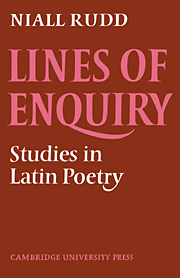Book contents
- Frontmatter
- Contents
- Preface
- Abbreviations
- 1 HISTORY: Ovid and the Augustan myth
- 2 IDEA: Dido's culpa
- 3 IMITATION: association of ideas in Persius
- 4 TONE: poets and patrons in Juvenal's seventh satire
- 5 ARCHITECTURE: theories about Virgil's Eclogues
- 6 THEORY: sincerity and mask
- 7 TRANSLATION
- Index of writers, scholars and translators
- Frontmatter
- Contents
- Preface
- Abbreviations
- 1 HISTORY: Ovid and the Augustan myth
- 2 IDEA: Dido's culpa
- 3 IMITATION: association of ideas in Persius
- 4 TONE: poets and patrons in Juvenal's seventh satire
- 5 ARCHITECTURE: theories about Virgil's Eclogues
- 6 THEORY: sincerity and mask
- 7 TRANSLATION
- Index of writers, scholars and translators
Summary
It has long been acknowledged that the story of Dido in Books 1 and 4 of the Aeneid has some of the elements associated with tragedy. These elements have been listed by A. S. Pease on pp. 8–11 of his massive commentary and discussed at greater length by DeWitt, Maguinness, Quinn, and others. We therefore enquire from time to time what tragic view the episode embodies. In a lecture to the Virgil Society in 1951 Professor R. G. Austin described the death of Dido with his usual blend of sympathy and scholarship, adding as a comment: ‘The Queen of the Gods… had ended her sport at last. You will remember Hardy's words at the end of Tess: they have their place here.’ Hardy's words come, of course, in the last paragraph of the book, just after Tess has been executed for murder: ‘“Justice” was done, and the President of the Immortals (in Aeschylean phrase) had ended his sport with Tess.’ In his introduction to the same novel Hardy cites as a precedent for this remark Gloucester's well-known words in the fourth act of King Lear:
As flies to wanton boys are we to the gods;
They kill us for their sport.
The two quotations are connected by the idea of divine sport. Men and women suffer and die to provide amusement for the gods. On the plainest interpretation both Gloucester and Hardy are claiming that the gods take a malevolent pleasure in destroying human lives.
- Type
- Chapter
- Information
- Lines of EnquiryStudies in Latin Poetry, pp. 32 - 53Publisher: Cambridge University PressPrint publication year: 1976
- 2
- Cited by



